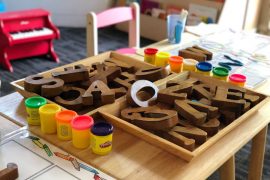3. Remember that children only accept our leadership because of the relationship we have with them.
If they resist or defy us, it’s a sign that we need to focus on connecting more. If your child often refuses to cooperate, be sure you’re spending daily Special Time. Every family I know that has made Special Time a priority has reported a more peaceful household.
4. Renounce punishment.
If you’ve been swatting your child’s hand or dragging her to time out, you can count on her being less cooperative. That’s because she doesn’t believe you’re truly on her side. And she isn’t developing the part of her brain that allows her to switch gears — because why should she? She’s being forced from outside, so she isn’t developing self-discipline. So when you make a request, she doesn’t have the brain control or motivation to comply, unless you threaten. (See What’s Wrong With Strict Parenting?) If you want cooperation without threats or punishment, you need to focus first on connection, so your child WANTS to follow your lead.
5. Look for a win/win solution.
Okay, so she can’t climb up on the shelves. But can you get the stepladder with her and spot her to climb up? Most of the time, if you clarify your concerns, you can find a way to meet both your needs. This doesn’t mean you go to heroic lengths to meet her desires all day long. It means that your child knows you’re on her side, and that you’ll try to balance her desires with the rest of the family’s needs.
6. Welcome the meltdown.
There are times when you just can’t find a win/win solution. Your child’s every desire does not have to be satisfied. In fact, often young humans (like adults) provoke a fight when they just need a chance to vent some big emotions. Especially if you’re transitioning from punishment to peaceful parenting, your child may act up to signal that he needs your help to empty that emotional backpack.
So set a kind, clear limit and summon up all your compassion. That creates the safety for your child to show you his tears and fears. When he acts like it’s the end of the world, remember that young children have big feelings, and their brains haven’t yet developed enough to process emotions by talking. Accept his disappointment with as much empathy as you can, even if his anger is directed at you.
Your compassion communicates that you understand, and you’re truly sorry it’s so upsetting for him. Your calm (not your words) communicates that you also know that these are just feelings, which will evaporate once they’re expressed, and the sun will come out again. Experiencing all those emotions in the safety of your presence, and learning that she can make it through and come out okay, is how your child develops resilience.
7. Remember that your job is to be the leader.
Being in charge means you act like a leader, which means you set clear limits. But you’re not a dictator. Good leaders lead by example. They listen, try to balance everyone’s needs, and protect. Being in charge means you take responsibility to provide a wholesome, nurturing environment. You set clear expectations and give your child whatever support she needs to meet them. So when she isn’t cooperating, consider what kind of support she needs from you.
8. Take the time to process your own emotions about how you’ve experienced parents being “in charge”.
For instance, if your parents were very strict, you may fear that you’re not in charge unless you’re controlling your child’s every move. Or maybe you don’t want to repeat that pattern, so you don’t set limits at all. That doesn’t help your kids. (See What’s Wrong with Permissive Parenting?) And most likely, you’ll end up yelling when things finally get out of hand. Kids without limits always push us to our limits.
If, instead of getting hijacked by our own childhoods, we can let ourselves feel all those old emotions of how alone we felt, how hurt, how sad… they no longer control us. We won’t go into fight or flight when our kids are upset. We’re free to set limits and guide our child with empathy. When we lose it, we can ditch the guilt, step up our self-care, and reconnect with our child.
Letting kids do whatever they want wouldn’t be good for them, or for us. But the wonderful thing about empathic limits is that they help kids WANT to cooperate.
So you get to be more peaceful.
Find the original article here.
by Dr. Laura Markham, founder of AhaParenting.com and author of Peaceful Parent, Happy Kids, Peaceful Parent, Happy Siblings and her latest book, the Peaceful Parent, Happy Kids Workbook.










